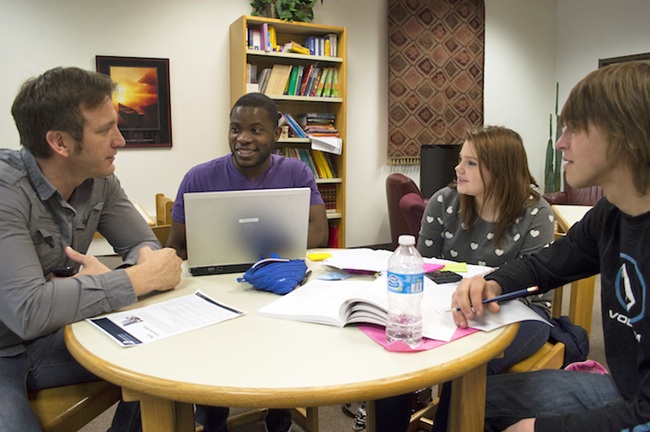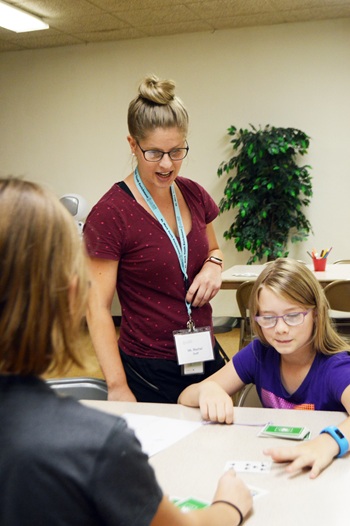
A new partnership between the Community Foundation of Greater Dubuque and the GRAD Partnership is helping bring a new approach to student success to Eastern Iowa schools.
In our community and across the country, young people are experiencing challenges that previous generations couldn’t have imagined. Growing up during a global pandemic while also navigating rapidly advancing technology, they seem disconnected from what matters most in their development, from their education to their relationships.
We at the Community Foundation of Greater Dubuque are proud of our partnerships with local educators that help shed light on these challenges, but sometimes it’s the stories from families that are the most eye-opening: In some cases, students report feeling unseen by the adults in their school, or they don’t understand how their classroom experiences benefit them in the real world. Some students have even shared that they don’t know the name of their teacher.
Hearing stories like these, it’s not surprising that chronic absenteeism and course failures are reality for many. These frustrations and failures make us determined to understand the root causes and how our schools can create transformational solutions. That’s where the Community Foundation’s work with the GRAD Partnership (Gradpartnership.org) comes in.
The GRAD Partnership is a collaborative, national effort partnering with schools, districts and communities to use high-quality student success systems so that schools are empowered to graduate all students ready for the future. Its work represents the culmination of more than a decade of research and efforts to develop and validate student success systems.
This year, the Community Foundation became one of the GRAD Partnership’s newest “intermediaries” – partner organizations with deep community ties and expertise to ensure that student success systems are responsive to local conditions.
“Before we learned about the GRAD Partnership, we had been engaging stakeholders to tackle chronic absenteeism,” says Nancy Van Milligen, president and CEO of the Community Foundation. “But we struggled to find methods that could both change the systems that held the problem in place and also be scaled to drive impact across our seven-county region.
“When we were introduced to the GRAD Partnership, though, we got excited. Here was an approach that appeared to be exactly what our schools needed to address our post-COVID reality of chronic absenteeism, course failures, and brain health challenges.”
New Insights and Approaches
Starting this year, the Community Foundation will be working with educators in local school districts to determine the best ways of implementing the GRAD Partnership framework and determining how it complements existing strategies.

That means it’s still early to tell what this new approach looks like in the Dubuque region. However, conversations with teachers in districts across the country that have put the GRAD Partnership framework into action reveal remarkable insights. Take the story of Lisa, a high school teacher in Albuquerque, NM, for example.
At her school, initiatives were everywhere. Sometimes, there were too many to count. With the GRAD Partnership’s approach, she combined several of these teams into one with a focus on student success. Her goal was simple: Build on what was working and make it stronger.
Looking at student data, the team pinpointed a small group of 25 students who had good attendance but, frequent behavior referrals and were failing classes. To understand the causes, they invited these students to a luncheon focus group and asked questions like, “How are you being greeted every day when you enter school?” Based on the responses, the team developed activities for all students and staff during the first days of the new school year with an emphasis on student and staff connectedness.
Like other teachers we talked with, the teachers in Lisa’s school started with a simple recognition: Their students weren’t just struggling academically. They were struggling to feel seen, heard and valued as partners in their own learning.
Thinking Big, Starting Small
Transformation isn’t about complete overhauls. Instead, it’s built on daily decisions to invite students into conversations that traditionally happen without them. Students are co-creating classroom expectations through regular dialogue sessions in which they identify what helps them learn best. They are involved in analyzing their own data patterns, participate in student success team meetings when appropriate, and help design the supports they need. With other approaches, they might just be recipients of interventions; with this approach, they are partners in identifying what’s working and what needs to change.
The GRAD Partnership’s student success framework provides the structure that makes this possible. Rather than relying on intuition alone, teachers have a data-driven system for identifying students who need support and evidence-based strategies for engaging them in finding solutions. When students see their real-time data on their indicators – attendance, behavior, course performance and well-being – they become active participants in finding solutions.
Early Wins and Future Vision
The GRAD Partnership’s Year-Two Impact Report, released over the summer, shows that middle and high schools implementing student success systems are making substantial progress in reducing chronic absenteeism and course failure rates, which are strong predictors of high school graduation and postsecondary success. The report also shows schools reducing disciplinary referrals and students developing a stronger sense of agency, belonging and connectedness.
Teachers we spoke with shared anecdotes that reinforced the GRAD Partnership’s data. For example, one teacher’s student, an English language learner, said she didn’t feel connected to any other students or adults in the building. She was part of a small group of students who were given a survey question every other Friday. One question hit hard: “Did a teacher ask how you were doing, and did they actually care about your response?” Her honest answer was “no.”
Once educators learned this, a teacher met the student at the door every morning and greeted her by name. During recess, teachers coached her to say, “Can I join you?” to other students. Slowly, the walls came down. She felt she had friends at school and that her teachers cared about her. She felt comfortable telling her teacher that she missed school because of immigration court and because she didn’t have a metro card. She felt like she belonged, and her attendance improved.
“Seeing the data and hearing the success stories makes us at the Community Foundation eager to help teachers implement this approach right here in the Dubuque region,” Van Milligen says. “Educators implementing the GRAD Partnership framework are proving that student-centered culture is more than just a nice idea. It’s a practical reality that transforms outcomes for everyone involved.
“They’re showing us that when we trust students to be partners in their education, when we center their experiences and agency, we don’t just improve test scores or graduation rates. We restore the fundamental relationship between learner and learning that makes education meaningful.”
The Community Foundation of Greater Dubuque Envisions a vibrant and inclusive Dubuque region where everyone can thrive. Visit Dbqfoundation.org to learn about the many ways we are building a strong, thriving Greater Dubuque for all—and how you can donate your time, talents, and dollars to transform our region.
This article is made possible by a partnership between the Community Foundation of Greater Dubuque and Julien’s Journal.
Photos provided by the Community Foundation of Greater Dubuque.
Read Julien’s Journal, CHOICES For Fifty Plus and Tri-State Home TRENDS from the Comfort of Your Home!
Click Here or call 563.557.7571 to subscribe for convenient delivery to your home or business by mail of all three magazines for one low subscription price.




Comment here